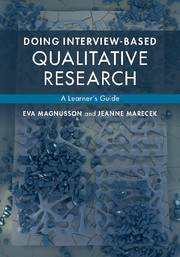Book contents
- Frontmatter
- Contents
- 1 Introduction
- 2 Some examples of interpretative research
- 3 Planning and beginning an interpretative research project
- 4 Making decisions about participants
- 5 Designing the interview guide
- 6 Doing the interview
- 7 Preparing for analysis
- 8 Finding meanings in people's talk
- 9 Analyzing stories in interviews
- 10 Analyzing talk-as-action
- 11 Analyzing for implicit cultural meanings
- 12 Reporting your project
- Epilogue
- References
- Index
3 - Planning and beginning an interpretative research project
Published online by Cambridge University Press: 05 October 2015
- Frontmatter
- Contents
- 1 Introduction
- 2 Some examples of interpretative research
- 3 Planning and beginning an interpretative research project
- 4 Making decisions about participants
- 5 Designing the interview guide
- 6 Doing the interview
- 7 Preparing for analysis
- 8 Finding meanings in people's talk
- 9 Analyzing stories in interviews
- 10 Analyzing talk-as-action
- 11 Analyzing for implicit cultural meanings
- 12 Reporting your project
- Epilogue
- References
- Index
Summary
In Chapter 2, we described some studies that used interpretative approaches. These descriptions gave you a taste of how the researchers went about their projects. They also pointed to some concrete steps involved in planning and doing interpretative research. In this chapter, we describe in closer detail what you need to think about and do during the initial stages of a project. In Chapter 2, we also introduced the terms “knowledge interest” and “researchable question.” To recap, a knowledge interest is the general topic that a researcher sets out to learn about. As you learned, a knowledge interest is usually stated in general or abstract terms. It is usually not researchable in itself; researchers therefore need to devise one or more researchable questions. Developing researchable questions is a crucial first step in planning an interpretative research project. It demands a great deal of thought and effort.
Knowledge interests often have their origins in a researcher's everyday experiences, including his or her personal concerns and commitments. They may also originate from the concerns or experiences of a social group about which the researcher is knowledgeable, or from reading the research literature. The projects you read about in Chapter 2 originated in the researchers' general and overarching knowledge interests, which were based in different spheres of daily life and different spheres of society. Those descriptions, of course, show only a few of the possible knowledge interests that interpretative researchers might have and only a few of all possible settings where such interests can arise. When you read the research literature, you will see many more.
As you begin to map out a project, it is a good idea to clarify what your knowledge interests are, and the sphere of your life or of society from which they emerge. Make notes about your reflections and recollections. As we discuss in the next section, you should record such reflections in a research journal dedicated to the project. You will be able to use those reflections when you move from your knowledge interests to the detailed plan for your study.
- Type
- Chapter
- Information
- Doing Interview-based Qualitative ResearchA Learner's Guide, pp. 27 - 33Publisher: Cambridge University PressPrint publication year: 2015

